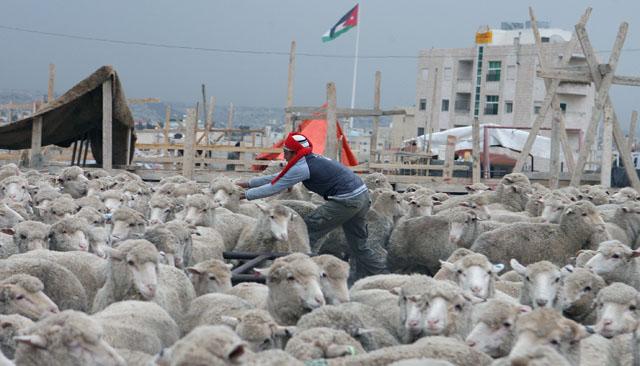You are here
Public urged to slaughter sheep in designated areas
By Hana Namrouqa - Sep 14,2014 - Last updated at Sep 14,2014

AMMAN — The Ministry of Agriculture on Sunday warned the public against slaughtering livestock in the streets or private backyards during Eid Al Adha to prevent the spread of disease-transmitting insects.
The slaughter of sheep and livestock as sacrifices during Eid Al Adha (the Muslim feast marking the end of the pilgrimage season) must only be carried out at municipal slaughterhouses and locations designated by authorities for the sale and slaughter of sheep and livestock, said Nimer Haddadin, spokesperson of the Agriculture Ministry and its slaughterhouse national committee.
“Slaughtering livestock on the street or in private backyards creates serious health and environment problems. People must abstain from such a negative, old practice,” Haddadin told The Jordan Times.
In Eid Al Adha, Muslims of sufficient means are required to sacrifice livestock in remembrance of Prophet Ibrahim’s willingness to sacrifice his son Ismail to God.
This year, Eid Al Adha is expected to fall during the first week of October.
Haddadin said slaughtering livestock in areas other than those designated by the authorities also causes the spread of rodents.
“In addition, butchers at the slaughterhouses inspect the sheep before slaughtering them to make sure they are free of any disease,” he highlighted, noting that there are certain protocols that must be followed when sacrificing an animal during Eid.
“Islamic teachings encourage people to treat the animal that will be sacrificed gently and with respect. Butchers must carry out quick slaughtering so that the animal doesn’t suffer,” Haddadin said.
Last year, 59,540 heads of livestock were slaughtered at the Greater Amman Municipality (GAM) slaughterhouse during Eid Al Adha, with 59 veterinarians supervising the process.
Every year, GAM allows traders to sell sheep in designated stockyards around the city that are far from residential areas.
Haddadin noted that the number of livestock in the local market for the Eid sacrifice surpasses the demand, which stands at around 300,000 heads annually.
“There are more than 400,000 heads of imported sheep, around 200,000 heads of local livestock as well as a large number of local and imported calves and camels,” Haddadin said, noting that the ministry’s ban on sheep imports from Romania is still in place since the country has not been announced as free of bluetongue disease.
The Agriculture Ministry slapped the ban on the import of cattle and sheep from Romania late August after cases of bluetongue disease were reported.
Jordan imports cattle and sheep mainly from Australia, followed by Romania and then Sudan.
Related Articles
AMMAN — The Greater Amman Municipality (GAM) announced on Wednesday 12 locations across the capital for selling and slaughtering sheep ahead
The ban on sheep imports from Romania will neither raise livestock prices in the local market nor create a shortage ahead of Eid Al Adha, a government official said on Sunday.
AMMAN — The Agriculture Ministry has finalised preparations for Eid Al Adha, a ministry official said on Monday, adding that a sufficient su
















